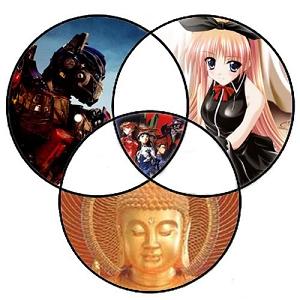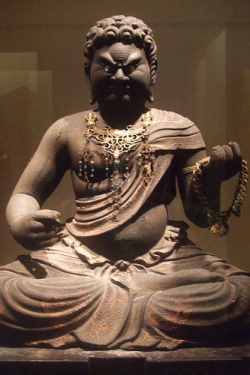I think we need to talk to each other about our spiritual lives. Even though we may respectfully disagree, I believe that peaceful co-existence of all religions – including atheism – depends on this. Hence every now and then I feature interviews or guest posts on Spritzophrenia. You can find other interviews here.
A while back Jared Cowan of To Hold Nothing shared about his journey from Christian to Deist to Atheist. Here is part two where he talks about his adoption of Buddhist beliefs:
|
If I tried to label my current beliefs in some specific way, the words that come to mind are secular, Buddhist and spiritual, in that order of priority. Being secular doesn’t mean I outright reject religion and say it must be eradicated (technically anti religion), but regard it as something not for me, since I find fulfilment in things that we all share as human beings, as part of the whole world, outside of a temple, the “profane” beings we are born as, only becoming sacred by experience. I believe learning about all the good and bad things in life would enrich our lives a great deal. I can understand people’s religious perspectives as a religious studies’ major, but I don’t agree with them as truth or explicit reality, but simply interpretation through perception. You and I may perceive that a person has a “miraculous” recovery from cancer. You might be inclined to see the supernatural in it; I see the paranormal at best in that it is unexpected, but not absolutely unexplainable by scientific principles and methods. In this way, I am secular because I hold science and sophia (wisdom in the philosophical sense that Aristotle noted) in higher respect than the sacred and supernatural (I love alliteration, don’t you?). |

|
Being Buddhist might be too general and easily misunderstood a label, but saying I’m Zen is equally too specific on the flip side. I find more influence in Zen and Ch’an (the Chinese equivalent) thought and philosophy, such as D.T. and Shunryu Suzuki, as well as older monks like Linji (his teaching of non attachment is where I derived my blog name, To Hold Nothing), Dogen Zenji, Takuan Souhou and Ikkyu (notorious for associating with prostitutes as a way to achieve enlightenment). If I had to clarify, I find more truth in Buddhist teachings and beliefs than from Christianity or other religions. Daoism is a close second. I’ve intuited ideas of Buddhism as early as high school, in ideas such as rebirth (not strictly reincarnation), impermanence (a translation of the Sanskrit word “anicca”) and dependent origination. I’ve found I can appreciate things all the more because they are temporary and accept the passing away of people and things in one way or another. I recall both losing a beloved tabby cat to a blood clot and having to wipe my OS a few months ago, though not having to sacrifice my files because of technological advances.
I understand the spiritual, in my atheist perspective, as Andre Comte-Sponville put it,
“The spirit is not a substance. Rather, it is a function, a capacity, an act (the act of thinking, willing imagining… ) —and this act… is irrefutable, since nothing can be refuted without it.”
More particularly, he notes that the term “spiritual” can be equated with the word mental or psychic. I’d daresay it’s almost aligned with psychology in a sense, though not strictly the scientific, but the philosophical aspects, which connect in a sense with existentialism. I approach life as a series of choices that make the biggest difference, not those things out of my control that I must confront with resignation and anxiety. I am spiritual/existential because I recognize the inevitable connection we must admit of the physical we experience to the mental we take for granted. I’m not spiritual in a mystic sense. I’m spiritual in that I can be introspective and extrospective without focusing on one or the other too much.
I don’t think I can synch up the world’s ups and downs the same if I tried to believe there was some consciousness behind things that even remotely cared for humans. My Christian heritage is only partly beneficial to me inasmuch as Jesus’ teachings partly align with Siddhartha Gautama’s and other bodhisattvas. Jesus also said more explicitly concerning corruption that we are not evil because of things outside us; we are evil because of internal dispositions and behaviours we choose (I don’t think of this like sin, though). We may have parts of ourselves that are harder or impossible to alter, but it doesn’t mean we cannot recognize them and seek to better ourselves by personal habits and other actions. In this way, I find Buddhism to be a strong influence on my life and it will probably be until I die. I’ve become more peaceful, calmer and more able to confront people I disagree with on a level that didn’t exist before I seriously considered Buddhism in a larger context of psychology and ethics.
I still have my personal flaws (a temper I inherited in part from both my parents, for example), but with Buddhism, I feel more motivated to actually change myself, even if it’s a slow process. I also feel a sort of melancholy in not truly having yet sought out various connections with Buddhists from Asian areas in order to understand their perspective more. I spoke with a Tibetan monk and it was a great eye opener to how much I’ve come to understand the system in only the two years I’ve studied it in detail since I graduated. As a Westerner in many senses, such as most of my education in philosophy and religion, there is a barrier I have to violate constantly in order to affirm the beliefs I find myself drawn to. These beliefs are very different from not only the culture and background I had in my family, but the general frame of reasoning any Westerner uses, which is more based in rationalism, empiricism and Greek philosophy. I do nonetheless find some inspiration from these sources, such as Socrates’ elenchus method and Heraclitus’ more natural formulation of the Logos idea.
I don’t think that Buddhist values and perspective are so radically different that I cannot coexist and find common ground with theistic Americans. I may approach things with a different perspective or sense of humor, but I can still respect American values of military, patriotism or sports. Or at least respectfully disagree with them. I consider myself a conscientious objector, not just through ethical opposition to violence and war as a tool of the state’s potential abuse to advance itself, but through Buddhist and even Christian philosophy of finding peace with others without the need to resort to violence. I don’t find a terrible amount of inspiration or morale from flying the America flag; any flag, for that matter. I’m actually of the opinion that the occasional destruction of symbols like that is a way for us to relinquish our attachments. Clinging to them can be a justification for unjustified cruelty or negativity towards others. And I’ve never been one to join in team sports, except as a younger child. Now I prefer more individual-centered physical activity, such as the martial arts; Wado Ryu Karate and Tai Chi Chuan are both activities I try to practice often (and fail at being regular at).
Writing this has been a great exercise and this second part is still just the tip of the iceberg, I imagine. I’ll be more than happy to answer more specific questions about my beliefs. Thanks for the opportunity to get myself out there. Until next I post, Namaste and aloha to all.
===
Jonathan’s note: Check out the recent post on Christian Buddhism. Click the Buddhism link on the right to find more posts relating to Buddhism. The image is my choice, Jared is not responsible for my poor taste 😉
Respond
? What do you think?
Please subscribe (top left) 🙂
Please share this article:
Bruce Cockburn | Silver Wheels








